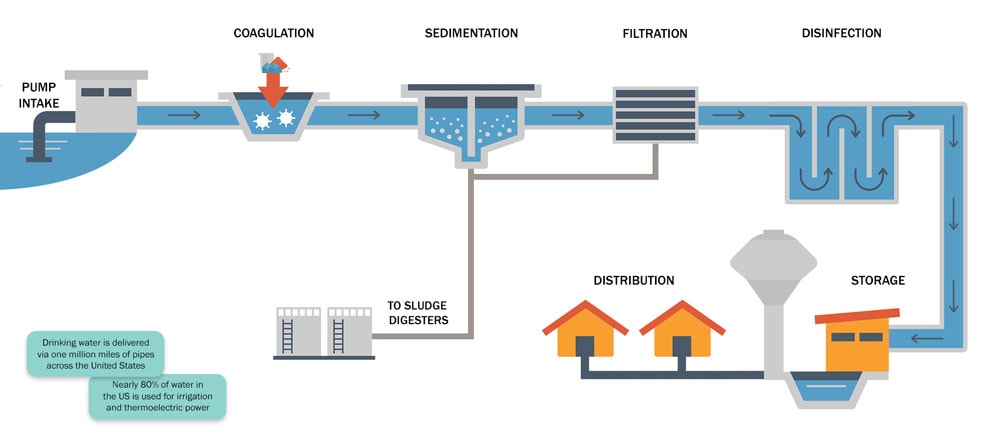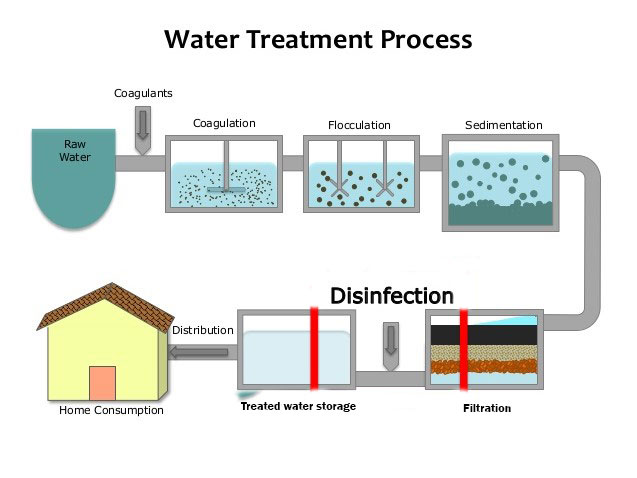Exploring Water Technology Startups: Exactly How They Transform Lasting Solutions
Water Technology startups are becoming critical players in the mission for sustainable solutions to international water concerns. These business take advantage of cutting-edge modern technologies to improve water efficiency and management. Their contributions attend to pressing challenges such as shortage and contamination. In spite of their potential, they deal with numerous challenges that could affect their success. Understanding these characteristics sheds light on the future of water sustainability and the function these start-ups may play fit it.
The Relevance of Water Technology in Today's World
As worldwide water scarcity magnifies, the importance of water Technology comes to be increasingly evident. Water Technology plays an important duty in addressing the difficulties positioned by reducing freshwater sources and increasing demand. It incorporates a broad series of technologies, including innovative purification systems, wastewater therapy innovations, and clever irrigation options. These developments not just enhance the effectiveness of water usage yet also promote sustainable techniques across various markets, consisting of farming, sector, and urban development.
Moreover, the importance of water Technology prolongs past source administration. It cultivates strength versus environment modification effects, such as droughts and floods, by supplying adaptive services for water conservation and management. Additionally, it supports public health by ensuring access to tidy and safe drinking water. As the globe faces expanding water-related challenges, the integration of sophisticated water modern technologies is essential for cultivating sustainable growth and safeguarding water availability for future generations.
Innovative Solutions From Water Tech Startups
While traditional methods to water monitoring have actually served their function, a new age of water technology startups is revolutionizing the market with cutting-edge remedies (Water Technology Startups). These companies leverage innovative technologies to resolve pushing water issues, such as scarcity, contamination, and inefficient distribution. Lots of start-ups utilize expert system and artificial intelligence to maximize water use and forecast need, resulting in more sustainable methods
In addition, numerous firms focus on creating sophisticated filtering systems that get rid of contaminants and make water risk-free for consumption. Others discover decentralized water therapy modern technologies, permitting communities to manage their water resources much more successfully. In addition, some start-ups are introducing wise irrigation services that minimize water waste in farming, advertising ecological preservation.
Case Researches: Successful Water Technology Startups
Countless water Technology startups have actually become leaders in dealing with international water challenges through cutting-edge techniques. One noteworthy instance is Xylem, which focuses on water analytics and clever infrastructure to optimize water use and decrease waste. Their services have actually been implemented in various districts, demonstrating significant enhancements in water management effectiveness.
An additional successful start-up, Absolutely no Mass Water, has established solar-powered hydropanels that remove water vapor from the air, supplying sustainable drinking water in dry regions. Water Technology Startups. This Technology has been deployed in a number of countries, making certain communities have access to tidy water
AquaVenture Holdings runs a varied portfolio of water-as-a-service services, dealing with water deficiency through desalination and wastewater therapy. Their jobs have confirmed important in areas facing severe water shortages, showcasing the possibility of innovative water innovations to produce lasting, positive influences. These instance research studies highlight the transformative capacity of startups in the water Technology field.
The Duty of Smart Technology in Water Monitoring
Smart Technology plays an important role in modern-day water management by leveraging IoT applications to optimize source use. Data analytics boosts performance by supplying actionable understandings, while remote surveillance services enable real-time oversight of water supply. Together, these developments change just how water is handled, promoting sustainability and functional effectiveness.
IoT Applications in Water
As water deficiency and monitoring difficulties increase around the world, the integration of Web of Points (IoT) applications has actually become a critical remedy in optimizing water sources. IoT Technology promotes real-time monitoring and evaluation of water supply, enabling much more effective use and administration. Sensing units deployed in different water facilities can track top quality, circulation prices, and leakage, offering useful information to stakeholders. This data empowers customers and utilities to make enlightened choices, reducing waste and enhancing conservation efforts. Furthermore, clever irrigation systems utilize IoT to optimize water shipment for farming, guaranteeing that crops get the correct amount of water at the ideal time. Overall, IoT applications are transforming traditional water administration practices, promoting sustainability and durability in water source systems.
Data Analytics for Performance
Utilizing information analytics is crucial for enhancing effectiveness in water administration. Water Technology start-ups are increasingly making use of advanced analytics to optimize resource allowance and decrease waste. By examining information from different resources, these start-ups can recognize patterns and patterns that inform far better decision-making. As an example, predictive analytics can anticipate water demand, allowing utilities to readjust supply appropriately, therefore reducing surpluses and lacks. Furthermore, real-time information handling enables the immediate discovery of leaks and inadequacies within circulation systems, greatly lowering functional expenses. Furthermore, data-driven understandings empower stakeholders to execute targeted preservation methods, promoting sustainable methods. Essentially, integrating data analytics right into water administration not just simplifies operations yet likewise promotes long-term sustainability in water source use.
Remote Tracking Solutions
While traditional water monitoring systems often battle with inadequacies, remote monitoring services are transforming just how water resources are handled. These innovative modern technologies make it possible for real-time information collection and analysis, permitting stakeholders to keep an eye on water quality, circulation prices, and use patterns from afar. Making use of sensors and IoT tools, remote tracking provides instant understandings that help with positive decision-making. This change not only boosts functional efficiency yet additionally advertises sustainability by reducing water waste and maximizing resource appropriation. Furthermore, remote surveillance systems can identify possible problems before they intensify, thus lessening the danger of contamination or framework failure. As water Technology startups proceed to develop these remedies, the market is poised for substantial advancements in lasting water administration methods.
Obstacles Encountering Water Technology Startups
Water Technology start-ups come across considerable difficulties that can hinder their growth and success. Key problems include protecting adequate financing, steering via complex governing settings, and completing in a crowded marketplace. These obstacles need calculated planning and technology to overcome.
Funding and Financial Investment Obstacles
Advancement in water Technology holds tremendous capacity for resolving worldwide difficulties, startups in this field often deal with significant funding and investment hurdles. Many capitalists continue to be careful, viewing the water sector as risky due to its complex regulatory landscape and lengthy development timelines. Furthermore, start-ups frequently have a hard time to demonstrate prompt success, which can prevent possible backers. Standard financial backing might forget water technology, favoring markets with quicker returns, such as technology or consumer goods. Safeguarding gives and federal government funding can be competitive and lengthy, more complicating economic security. Because of this, many cutting-edge water Technology startups find themselves in a perilous position, needing innovative financing techniques to browse these financial obstacles and attain their goals
Governing Compliance Issues
Steering regulative conformity is a considerable obstacle for startups in the water Technology market, as they must face a myriad of local, nationwide, and global laws. These policies frequently encompass water quality criteria, environmental management laws, and security methods, which can vary commonly throughout jurisdictions. Startups might discover it difficult to navigate this complex landscape, especially when scaling procedures or going into new markets. The prices related to compliance can be considerable, diverting sources far from technology and item growth. Furthermore, delays in acquiring needed licenses or accreditations can prevent development and market access. A robust understanding of regulative frameworks is important for these start-ups to ensure lasting procedures and stay clear of prospective legal repercussions.
Market Competitors Characteristics
As water Technology start-ups emerge in an affordable landscape, they encounter countless challenges that can impede their growth and development. Established firms often dominate the marketplace, leveraging resources and experience to maintain their placements. Start-ups have a hard time with restricted funding, which limits r & d abilities, making it hard to compete on Technology and rates. In addition, the rapidly evolving nature of water technologies needs consistent adjustment, additional click here straining startup sources. Regulative hurdles can make complex market access, as conformity with ecological standards is vital yet pricey. Bring in knowledgeable ability in a particular niche field presents an additional challenge, as bigger firms may offer more appealing work packages. As a result, these elements produce a complex setting for water Technology startups intending to do well.

The Future of Water Technology and Sustainability

The future of water Technology will likely focus on integrating expert system and data analytics to enhance water distribution and usage patterns. By using real-time information, firms can forecast lacks and take care of sources more effectively. Furthermore, lasting methods will come to be a keystone of the industry, encouraging circular economic climates where water is reused and dealt with. Inevitably, the ongoing evolution of water Technology will be important in developing durable infrastructures efficient in meeting the challenges posed by environment change and population development while promoting environmental stewardship.
Often Asked Concerns
What Are the Secret Metrics for Assessing Water Technology Startups?
Secret metrics for examining water Technology start-ups include market capacity, scalability, client procurement prices, revenue development, technology development, regulative conformity, environmental impact, affordable benefit, and group expertise, all vital for figuring out lasting stability and success.
Exactly How Can Individuals Support Water Technology Innovations?
Individuals can support water Technology innovations by purchasing startups, promoting for plan modifications, joining neighborhood efforts, sharing understanding regarding sustainable methods, and promoting recognition of water problems via neighborhood occasions and social media.
What Are Common Financing Resources for Water Tech Startups?
Typical financing sources for water technology start-ups consist of financial backing, government gives, crowdfunding systems, angel financiers, and corporate collaborations. These monetary opportunities help promote advancement and development in lasting water administration innovations.

Which Industries Benefit Most From Water Technology Advancements?
Industries such as agriculture, power, manufacturing, and local services benefit substantially from water Technology advancements. These innovations boost water performance, minimize expenses, and promote sustainable techniques, eventually adding to ecological preservation and resource management.
Exist Any Kind Of Regulatory Difficulties Specific to Water Innovation?
Yes, water Technology deals with regulative difficulties, including compliance with ecological standards, allowing processes, and differing regional regulations. These intricacies can hinder technology and reduce the execution of new modern technologies in the water administration market.
Water Technology startups are arising as vital gamers in the mission for lasting remedies to international water problems. As worldwide water shortage heightens, the relevance of water Technology becomes increasingly evident. Others explore decentralized water treatment modern technologies, allowing communities to manage their water sources extra successfully. Another successful start-up, Zero Mass Water, has actually developed solar-powered hydropanels that remove water vapor from the air, giving lasting alcohol consumption water in arid regions. Their projects have shown essential in regions facing severe water shortages, showcasing the capacity of cutting-edge water modern technologies to create long-term, favorable effects.